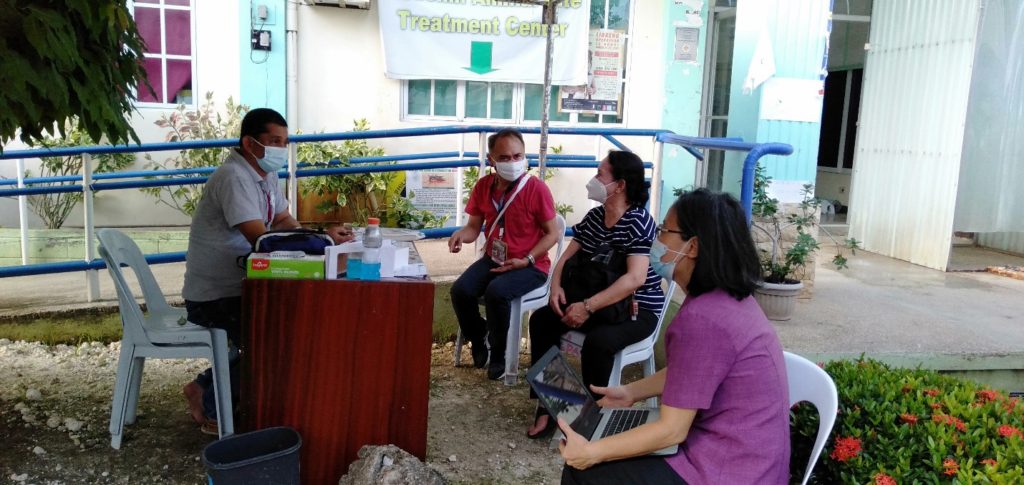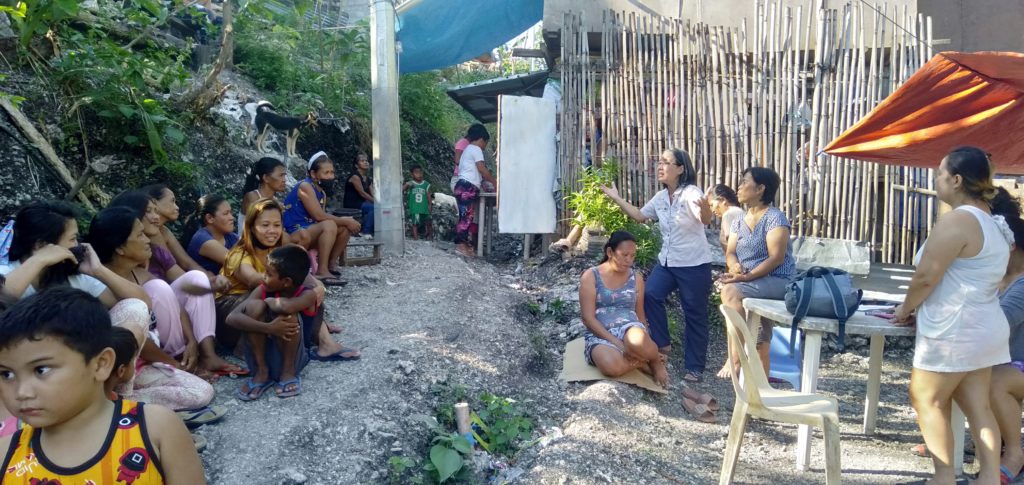A meeting with the municipal health officer (MHO) of Medellin, Dr. Oliver A. Gimenez was held on September 3 at 4 p.m. in the Medellin rural health unit. Donnalyn Y. Son, Nurse II of the RHU was also present. Project team included project staff Crescenciana Labitad, Edgar Gahisan and Dr. Erlinda Posadas. The meeting was to discuss the setting up of temporary treatment and monitoring facilities (TTMF) in Medellin.
Dr. Gimenez said that the TTMF of Medellin is located in Barangay Panugnawan. The efforts to set up one started in May 2020 when Medellin had its four positive cases of COVID which alarmed the local government unit. A site was identified by the engineering department, the Municipal Disaster Risk Reduction and Management Office (MDRMO) and other stakeholders. It was the site of an ongoing housing unit of the National Housing Authority (NHA) in Barangay Panugnawan. At that time, there were two nurses of the RHU who had worked in the Bayanihan TTMF center in Cebu City ; they gave ideas of how the TTMF should be.
Thus, the RHU studied the different Department of Health (DOH) circulars on the minimum infrastructure requirements and features of a TTMF. The LGU purchased materials and bought beds, tables, electric fans and other essential facilities to furnish the TTMF as well as installed water and electricity systems. There were also insulator roofings. There are three zones, namely, a contaminated zone which serves as the area where patients are admitted/contained, a buffer zone or potentially contaminated area which serves as an area for doffing of personal protective equipment (PPE), decontamination, and hand hygiene, and a sterile zone which serves as holding area and entrance for healthcare workers, and area for PPE donning of health workers.
The TTMF started its operation on the third week of June with five patients admitted. There were four rooms, with two patients per room. Nurses were deployed starting July second week. At present there are five pairs of nurses, each pair of nurses going on duty for seven days a week, then undergoing PCR test, then going off from duty. Another pair goes on duty with the same schedule.
Two additional rooms were later developed so that the TTMF can now accommodate a total of 12 patients at one time. It has six rooms. Dr. Gimenez said that they plan to develop four more rooms for a total of 20 patients who can be admitted at one time.
The RHU is applying for accreditation of the TTMF with the DOH. It shall submit the necessary requirements. It was visited by Dr. Jonathan Neil Erasmo, DOH-7 staff for accreditation in the first week of September.
Dr. Gimenez also said that there are positive COVID-19 cases who are allowed to have home quarantine as long as three criteria are met, the patient will have his own room, his own comfort room, and there is no elderly person or child in the house with him
On the installation of handwashing facilities, Dr. Gimenez reiterated what was agreed in the last meeting of the project staff with the mayor, that two facilities will be installed in Barangay Poblacion market and two facilities in the public market of Barangay Kawit, instead of the four sites identified in the grant agreement.
Dr. Gimenez was provided a copy of the “Concept Designs of Handwashing Facilities: Strengthening Urban Resilience for Growh with Equity (SURGE) Project.” The project team informed him that they will canvass for the suppliers of the facilities to be installed in the municipality.
Dr. Gimenez later showed the project team four handwashing facilities installed by the Philippine Red Cross and Americares organizations in the rural health unit. The team also set a date for a visit to the TTMF in Panugnawan.




